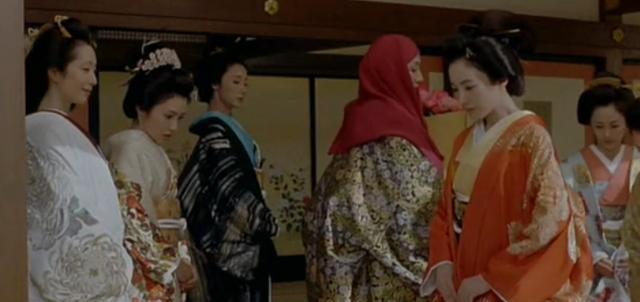During the Edo period, The Tokugawa Shogun's harem, Ōori, was unshakable from the Imperial Family or the Imperial Household, and the concubines in the side chambers were vacant and unsure.
To exaggerate, today is still a servant who helps the general carry his shoes, and tomorrow may be the little lord.
Even if they can't be in the side room, most people want to climb higher and higher, from lower-level female officials to middle and high-level female officials, work for thirty years, you can retire, receive a generous pension, and return to your hometown.
Therefore, the battle of the Great Ori is extremely fierce. The women pulled the mountain, you scrambled for me, you glanced at me, I kicked him...
In "Daio Japan", it is said that -
Working in a daughter country where competitors are on all sides, and there are ears on the front and back and left and right, perhaps there is really no one to rely on except the gods and Buddhas.
Low-level female officials can usually take leave to go to the temple to pray for gods, while the general and the middle and high-ranking female officials around the Imperial Terrace office rarely have the opportunity to go out of the city. Therefore, they usually ask someone to help them pray to God.

(Dai-O-miyadou)
If entering the temple is a legitimate way to pray that you can be invincible, then the female officials use more than that, in fact, they are on the left side of the door.
After all, the famous and upright gods may not be able to satisfy their dark psychology. Wanting to take shortcuts, they believed more in the hermits who practiced in the deep caves of the valley.
They would personally or invite the most trusted people to secretly find hermits to pinch, chant spells, cast spells, and help them get those who were not good for them.
However, is it useful?
Of course, there are also, for example, her opponents, really fell?
She would attribute this to the hermit.
But as modern humans, we know that this is purely a chance of success, nothing to do with the hermit.
However, at that time, they were convinced, which also made the hermits very rich. The wind blew harder and harder, finally making the general angry.
In the eighth year of Tenho (1837), the twelfth shogun Tokugawa Ieyoshi ascended the throne, and he changed the temple society, banned the popular spells, and forbade Ōo to arbitrarily order the cast of spells at Zengami-ji and Kanei-ji.
(Edo Wishing Tree)
However, you have to get rid of the root of the disease, as long as the palace fight is still there, this kind of thing cannot be forbidden.
If you can't ask the hermit to do it, come by yourself.
Where there is demand, there is supply. The royal merchants saw the opportunity, made mini lottery boxes that could be put in their pockets, and sent the female officials the "Hundred Signature Judgment Bills" for them to draw their own lots.
However, there is one thing that can be done more openly.
That's begging.
Many friends know that like the Central Plains Dynasty, Japan also popularized the primogeniture system, and some families even did it more desperately.
That is, the eldest son not only inherits his father's office, but also inherits most of his property. Other sons, on the other hand, can only fend for themselves.
No, the Edo Five Thousand Stone Samurai Kunaga family had two sons. The younger son knew that he had nothing to gain, and it was better to make a living for himself early, so he ran away from home, and his father and brother did not know where he went - in fact, he did not plan to find it.
Unexpectedly, the eldest son died of illness.
Now there is a big problem.
Because of the samurai position and property, if no one inherited it, the shogunate would take it back. At that time, the Hisanaga family will fall into disarray, the servants will be unemployed, and the samurai who serves his family will become ronin.
CHA?
Find your younger son.
Kung Fu pays off, and it is really found in a certain flag family. He was eating kelp shreds and fried tofu.
Come to think of it, when he heard that his brother was dead, he probably didn't have much expression, after all, the brothers were already very light.
But he knew how excited he would be when he would become Lord.
(Edo Castle Stills)
This salted fish turned over, and later the spring breeze was triumphant. He invited the samurai to his house to eat kelp shreds, oil tofu, and white rice to commemorate his good fortune.
Over time, his family's meal became more and more famous, and it was known as the Kaiyun rice of the Jiuyong family.
Every time it was time to serve meals, the female officials of the Great Olympic Army would send someone to ask for a bowl, hoping that they would also be blessed with luck.
However, even if the hermit plus the opening of the luck meal, there are very few who can really stand out among the thousands of women in Da'ao. Most of them also stayed up, waited until they were forty or fifty years old, retired to receive money, said goodbye to everyone, and went home to live a worry-free life.